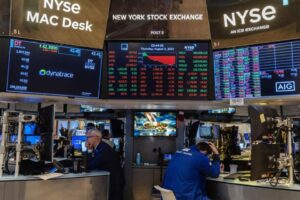Warren Buffett’s Apple stock dump was so big, it will force massive buying as funds rebalance
Passive funds tracking these indexes may now have to buy as much as $40 billion of Apple stock when they next rebalance, according to Piper Sandler.


Warren Buffett’s sudden sale of a huge pile of Apple Inc. shares has come with a surprise silver lining for investors in the iPhone maker: Its influence in major stock indexes is set to be fully unleashed.
Apple’s weighting in a slew of benchmarks has been depressed for years because Buffett’s Berkshire Hathaway Inc. tends to hold its investments for the long run, making them unavailable for trading. As a result, index providers calculated the tech company’s weight based on a methodology known as float-adjusted market capitalization.
Put simply, Apple’s true value is not reflected in many indexes.
In percentage terms, the numbers don’t seem huge — in the case of the S&P 500, for instance, 94% of Apple’s value is currently considered. That should now increase to 100%, according to Piper Sandler & Co. But in a $3 trillion company, it adds up.
In the wake of Berkshire’s sale, passive funds tracking these indexes may now have to buy as much as $40 billion of Apple stock when they next rebalance, according to Piper Sandler’s estimates. That’s triple the average daily trading volume of the company’s shares over the past month.
Index funds robotically stepping-in to replace another investor in one of the megacaps will offer ammunition to critics like David Einhorn, who argue passive investing has “fundamentally broken” the markets by making so much money value-insensitive. More immediately, it’s bad news for some other companies in the gauges, whose weights will be reduced to accommodate the change and whose shares will be sold by funds accordingly.
The first revisions won’t take place until the quarterly index rebalance due next month, and for now at least any shuffling looks secondary for a market that’s fixated on economic growth and central bank policies. But there is a cohort of traders who take positions in anticipation of events like this.
“We often see activity due to rebalances on our desk,” said Michael Kantrowitz, Piper Sandler’s chief investment strategist. “People want to be aware of it.”
A spokesperson for S&P Dow Jones Indices referred Bloomberg News to its index methodology and declined to comment further.








